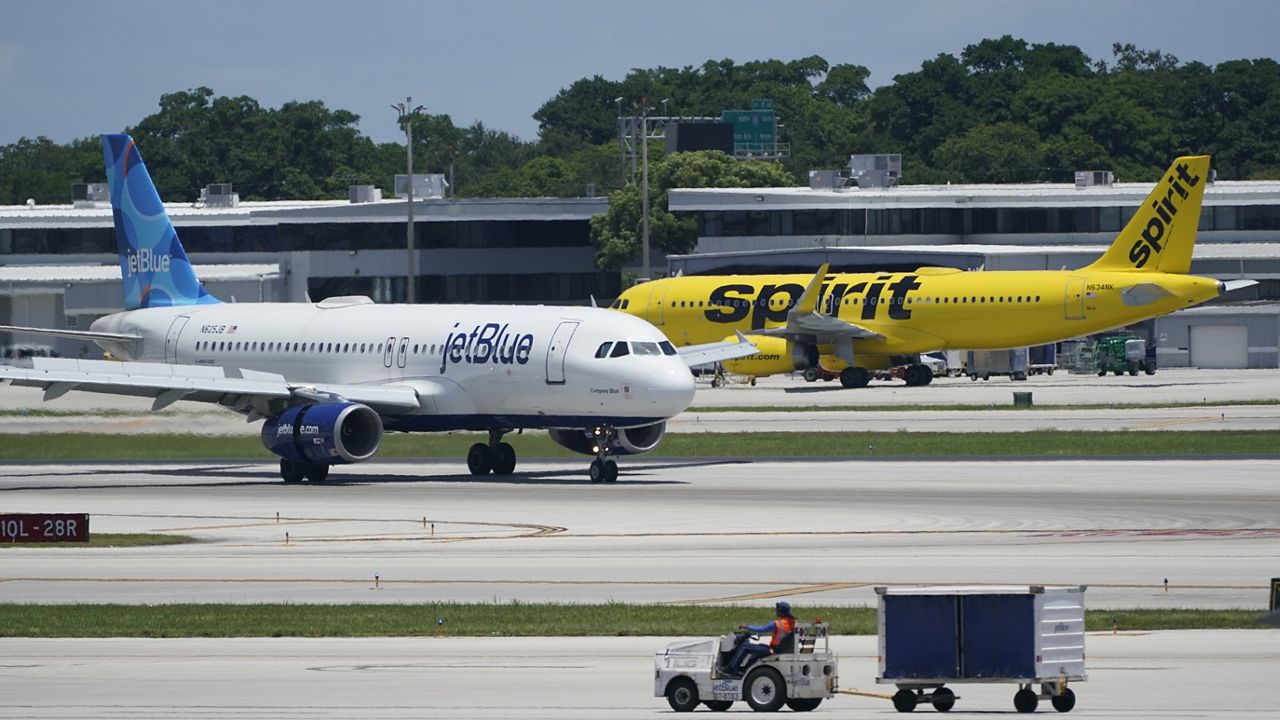The Justice Department has filed a civil antitrust lawsuit to block JetBlue from acquiring Spirit Airlines, the latest attempt by the Biden administration to prevent consolidation in the airline industry.
The $3.8 billion acquisiton of low-cost carrier Spirit would create the fifth-largest airline in the U.S. The airline agreed to sell itself to JetBlue last year after a deal with Frontier Airlines fell through.
The complaint, filed Tuesday in a Massachusetts court, alleges that the acquisition would reduce options for travelers, raise ticket prices and lessen competition in the industry.
"We allege that if allowed to proceed, this merger will limit choices and drive up ticket prices for passengers across the country," Attorney General Merrick Garland said at a press conference on Tuesday. "And we further allege that the impact of this merger will be particularly harmful for passengers who rely on what are known as 'ultra low-cost carriers' to fly."
"By acquiring Spirit, JetBlue will eliminate the largest, ultra low-cost carrier in the United States," Garland added.
"Spirit’s ultra-low-cost business model has increased competition and brought low fares to hundreds of routes across the country, making it possible for more Americans — particularly the most cost conscious — to travel," the complaint reads. "JetBlue competes hard against Spirit, and views it as a serious competitive threat. But instead of continuing that competition, JetBlue now proposes an acquisition that Spirit describes as ’a high-cost, high-fare airline buying a low-cost, low-fare airline."
“If the acquisition is approved, JetBlue plans to abandon Spirit’s business model, remove seats from Spirit’s planes, and charge Spirit’s customers higher prices,” attorneys wrote in the complaint. "JetBlue’s plan would eliminate the unique competition that Spirit provides — and about half of all ultra-low-cost airline seats in the industry — and leave tens of millions of travelers to face higher fares and fewer options."
New York, Massachusetts and Washington, D.C., joined the Justice Department in filing the lawsuit.
“Our complaint alleges the merger of JetBlue and Spirit would result in higher fares and fewer choices for tens of millions of travelers, with the greatest impact felt by those who rely on what are known as ultra-low-cost carriers in order to fly,” in a statement. “Companies in every industry should understand by now that this Justice Department will not hesitate to enforce our antitrust laws and protect American consumers.”
JetBlue and Spirit have anticipated a chllenge to the acquisition, which would be the first major airline merger in the U.S. since Alaska Airlines purchased Virgin America in 2016. In a statement released Monday ahead of the DOJ's filing, JetBlue contended that its acuisition of Spirit would actually lower costs for customers.
"JetBlue’s unique combination of low fares and great service is a competitive force that keeps the legacy carriers on their toes and results in lower fares," the company said Monday, contending that it was three times more effective bringing down competitors' fares than Spirit.
"The Big Four airlines have a lock on about 80% of the market," JetBlue added. "JetBlue’s combination with Spirit allows it to create a compelling national challenger to these dominant airlines, while also ensuring [ultra low-cost carrier] options remain available in overlap markets."
The Justice Department was under pressure from Democratic lawmakers and consumer advocates who have complained about a wave of earlier mergers that regulators approved, and which left fewer airlines controlling a greater share of the market. The administration’s concern about airline-industry consolidation was on display in 2021 when the Justice Department sued to kill a limited partnership between JetBlue and American Airlines in the Northeast.
JetBlue held on to hope that the administration would come around to its argument that the combination with Spirit would be far smaller than other deals and would help consumers by putting pressure on the bigger airlines.
They said the Justice Department created the environment of four airlines dominating the market, and JetBlue merely wanted a better chance at competing with the giants — all of whom grew through mergers and acquisitions between 2008 and 2013.
The Justice Department sued to block the last megadeal, American’s merger with US Airways, then reached a settlement that required the carriers to give up some gates and takeoff and landing slots at several major airports. Before that, the government allowed Delta to buy Northwest, United to merge with Continental, and Southwest to buy AirTran.
American and JetBlue are still waiting to learn the fate of a partnership that lets them work together on setting schedules and sharing revenue in Boston and New York. A federal judge in Boston is expected to soon issue a ruling, following a non-jury trial last fall.



